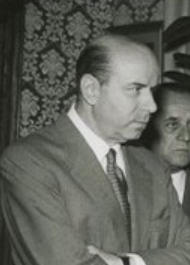Giuseppe Petrilli
(academic) | ||||||||||||
|---|---|---|---|---|---|---|---|---|---|---|---|---|
 | ||||||||||||
| Born | 13 March 1913 Naples, Italy | |||||||||||
| Died | 13 May 1999? (Age 86) Rome, Italy | |||||||||||
| Nationality | Italian | |||||||||||
| Party | Christian Democracy | |||||||||||
The first Italian European Commissioner on the Hallstein Commission 1958-1961. Attended 1965 Bilderberg meeting.
| ||||||||||||
Giuseppe Petrilli was an Italian professor and European Commissioner 1958-61.
He was a non-politician[1] appointed as the first Italian European Commissioner on the Hallstein Commission from January 1958 with responsibility for the Social Affairs portfolio. In September 1960 (on 8 February 1961) he resigned and was succeeded by Lionello Levi Sandri. He was a member of the 1979 group that produced the Spierenburg Report on the improvement of the working methods of the commission.[2]
He attended the 1965 Bilderberg meeting. He was the President of the European Movement from 1981-87.
The presidency of IRI
A professor, Giuseppe Petrilli became president of IRI (the Italian Institute for Industrial Reconstruction – a powerful state-owned holding company) in 1960 and served for almost twenty years, until 1979, going through both the period of the "economic miracle" and that of the crisis.[3]
In the 1960s, IRI was indicated as a positive model of state intervention in the economy; in 1967 Petrilli published a book entitled The entrepreneur state: validity and topicality of a formula, in which the role of IRI in the Italian economy was exalted, and which was translated into several languages. In the 1970s, with the recession, the function of IRI began to be questioned, but Petrilli remained president. His management was criticized for the tendency to centralize management powers on himself and on a few executives loyal to him.[4]
His clash with the president of Alfa Romeo Giuseppe Luraghi was noteworthy, who ended up resigning from office to escape the pressure received to build a third Alfa plant in Irpinia, the constituency of the then Minister of Industry Ciriaco De Mita[5]. The image of him was tarnished by the emergence of some financial scandals involving the companies of the group and by poor management results. Despite this, Petrilli remained president until 1979, when he became a senator elected on the Christian Democratic lists. In 1985, the Milan public prosecutor allegedly asked Parliament for authorization to proceed against Senator Petrilli for the establishment of black funds, deriving from sums subtracted from the availability of some companies controlled by IRI. Petrilli was acquitted of the accusation of false accounting thanks to age limitation on the case.
Senator
Giuseppe Petrelli became a member of the 8th Italian Senate after the 1979 elections.
He died on 13 May 1999, aged 86.
Event Participated in
| Event | Start | End | Location(s) | Description |
|---|---|---|---|---|
| Bilderberg/1965 | 2 April 1965 | 4 April 1965 | Italy Villa d'Este | The 14th Bilderberg meeting, held in Italy |
References
- ↑ https://www.webarchive.org.uk/wayback/archive/20060330120000/http://www.cps.org.uk/pdf/pub/71.pdf
- ↑ https://www.cvce.eu/en/obj/the_spierenburg_report-en-0b42bbaf-7770-4127-8421-da0edc9f49fe.html
- ↑ http://ww1.lapadania.com/?subid1=5428b0be-c33d-11e9-b352-26f3a5f9e4c
- ↑ . Pini in I giorni dell'IRI, Arnoldo Mondadori Editore, 2004, pag. 28
- ↑ G. Baldi in I potenti del sistema, Arnoldo Mondadori Editore, 1976, page 170
Wikipedia is not affiliated with Wikispooks. Original page source here